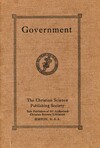

Are you sure?
This bookmark will be removed from all folders and any saved notes will be permanently removed.
Divine Economy
The economic systems of the world, like everything else which is a product of the human mind, are founded in inharmony. When the significance of this is fully grasped, the attempt to accomplish the impossible will be given up. Men will turn from effect to cause. They will begin to analyze that saying, so deep because so apparently simple, of Jesus of Nazareth: "For every tree is known by his own fruit. For of thorns men do not gather figs, nor of a bramble bush gather they grapes;" or, to reduce it to the terminology of the twentieth century, an economic system conceived in accordance with Principle cannot produce economic effects antagonistic to Principle. Therefore, any inharmonious economic effect must be produced by a cause antagonistic to Principle, since Principle, in its own nature, is harmonious. Speaking of men and women, on page 51 of "Unity of Good," Mrs. Eddy declares, with that marvelous insight which pierces straight to the spiritual fact, "They have none of them lost their harmonious state, in the economy of God's wisdom and government."
The word economy, of course, is not a mere synonym for frugality. It has come to mean frugality, amongst other things, it is true; but it is derived from two Greek words meaning house and steward, and in its true sense means "the administration of the concerns and resources of a community." Now, as every material phenomenon is the counterfeit of some spiritual reality, there is a divine economy of which all material economy is the counterfeit. It is this divine economy to which Mrs. Eddy refers in the passage just quoted; and it is in the exact proportion in which the individual masters this great metaphysical fact, that he realizes that precisely as he subjugates and destroys the material in his own consciousness he will succeed in demonstrating the at-one-ment of the spiritual reality with its Principle, God, and so begin to comprehend the meaning of that sentence on page 327 of Science and Health, "To the physical senses, the strict demands of Christian Science seem peremptory; but mortals are hastening to learn that Life is God, good, and that evil has in reality neither place nor power in the human or the divine economy."
Evil, being nothing but a negation of Truth, has, of course, a mere suppositional existence. Consequently, the appearance of any inharmonious effect in human economics points directly to the acceptation of an erroneous concept of law, and so to the necessity for correcting the mental impression conveyed by this supposititious law. It was precisely at such false impressions of law that Christ Jesus' whole system of demonstration was aimed. "If ye continue in my word, then are ye my disciples indeed; and ye shall know the truth, and the truth shall make you free." He could scarcely have said more clearly: If you accept my teaching,—that is, if you make it your own and demonstrate it,—you will be freed from all the impressions of false law by which you have limited yourselves, and will be able to prove the spiritual fact in feeding multitudes, walking on the waves, and raising the so-called dead. In other words, you will be "hastening to learn that Life is God, good, and that evil has in reality neither place nor power in the human or the divine economy."
Enjoy 1 free Sentinel article or audio program each month, including content from 1898 to today.
JSH Collections
This article is included in:
1921 - PAMPHLET
Government
JSH-Online has hundreds of pamphlets, anthologies, and special editions for you to discover.

May 15, 1920 issue
View Issue-
Political Preferment
PERCY PHILLIP VYLE
-
Instantaneous Healing
CLARA S. HARSH
-
A Word in Season
KATHERINE D. HOPE
-
Christian Science the Equalizer
MARION CAROLYN JONES
-
The Christian Science Practitioner
CHARLES G. BALDWIN
-
Expressing Good
JOHN ANDERSON
-
Evil Causeless
ANITA G. LITTLE
-
True Debt
HELEN T. BELFORD
-
Inasmuch as some misguided persons have distributed...
W. Stuart Booth
-
In a recent issue there appeared a report of a sermon...
A. J. Chapman
-
The Reverend Canon Field did right in going to the...
Percy H. Brooks
-
A critic complains of an abbreviated quotation
T. E. Davidson
-
Divine Economy
Frederick Dixon
-
Time and Space
Gustavus S. Paine
-
Admission to Membership in The Mother Church
Charles E. Jarvis
-
The Lectures
with contributions from Guy Parkhurst Estes, Arthur Hussey, Eugénie Paul Jefferson, H. Herbert Pain, Archibald W. Edes, Adelaide Burkitt, Rose C. Flenner, Edward E. Yaggy, Charles B. Jamieson
-
Four years ago I read "Science and Health with Key to the Scriptures"...
Helen Grow Rottschaefer
-
Words cannot express the great joy that has come into...
Katharine Murray
-
Availing myself of the opportunity offered in the periodicals...
Thorbjorn Johnson
-
It is with a deep sense of gratitude that I send my testimony...
Elizabeth S. Stroder
-
I am deeply grateful for the blessings Christian Science...
Hilda M. Harrison
-
In the year of 1900 or 1901, while my parents lived at...
Henry H. Gottschalk
-
A sincere desire to help some one else prompts me to...
Grace Hopkins
-
It was about fifteen years ago that I had my first treatment...
Anna Aldeson Railey
-
To-day while reading a certain testimony in the Sentinel,...
Elizabeth E. (Long) Evarts
-
It is more than six years since my family took up the...
Agnes R. Rockwood with contributions from C. S. Rockwood
-
I took up the study of Christian Science for release from...
Nancy E. White
-
Signs of the Times
with contributions from Arthur T. Morey


